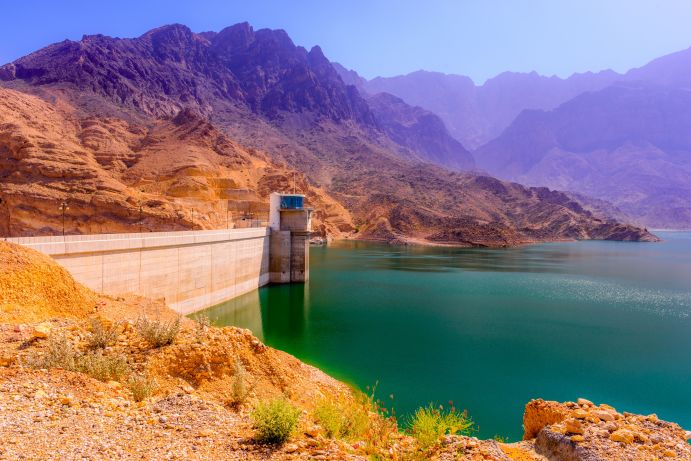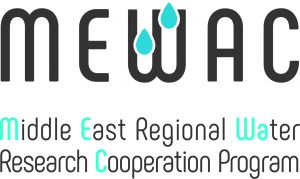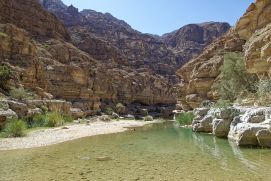Middle East Regional Water Research Cooperation Program (MEWAC)
Almost all countries in the Middle East suffer from a rapidly increasing water shortage. They belong to the group of countries most severely affected by water stress worldwide. As a result, the Middle East will need substantial investments and innovations in the water sector in the coming years. To this end, the Federal Ministry for Education and Research (BMBF) has initiated the funding measure "Middle East Regional Water Research Cooperation Program (MEWAC)". The aim is to contribute to enhancing water security in the Middle East across national borders by funding the development of new technologies and concepts that will increase water use efficiency and promote integrated water resource management.


Many regions in the Middle East are highly dependent on reservoirs and groundwater resources for their water supply. However, groundwater supplies are often recharged at low rates and will be largely depleted in a few decades at current rates of withdrawal. The level of competition for water is already high, characterized by an overuse of water resources, worsening living conditions and the loss of ecosystems. In addition, this region is particularly affected by global climate change. The increasing amount of wastewater caused by population and economic growth meets an inadequate wastewater infrastructure combined with unused potential for water reuse.
There are already efficient and proven approaches in individual countries, e.g. in Israel. However, there is limited transfer of successful solutions between the different actors due to the political conditions in the region. Multilateral research projects may overcome some of these barriers by jointly developing new solutions and by disseminating innovative environmental technologies in the participating countries.
The German BMBF is supporting such projects in the water sector with its new funding measure „Middle East Regional Water Research Cooperation Program (MEWAC)". The results will contribute to implementing the United Nations' Sustainable Development Goals (SDGs), particularly SDG 6 (Clean Water and Sanitation), as well as SDG 2 (Zero Hunger), SDG 3 (Good Health and Well-being), SDG 11 (Sustainable Cities and Communities), SDG 15 (Life on Land) und SDG 16 (Peace, Justice and Strong Institutions). The involvement of relevant actors from business, government und society is integral to the projects to ensure practical relevance and transferability of research results. The funding initiative is part of the BMBF strategy "Research for the Sustainable Development FONA".
The ministry will fund multilateral research and development projects on:
- Technologies to increase water use efficiency
- Integrated Water Resources Management
The projects are categorized into two modules:
Module A: Multilateral Cooperation between research partners from Germany, Israel und at least one other country from the Near and Middle East; corresponding call for proposals published by the Israeli Ministry of Science and Technology (MOST)
For this module three joint projects have been chosen starting on July 1, 2021:
- EXALT: Coupling thermal desalination and dewatered salt discharge with hydroponic crop production using heat pumps
Contact: Dr. Jörn Germer, Universität Hohenheim - TransFresh: Real-time modeling and management of transboundary water resources using the river Yarmouk as a case study
Contact: Dr. Christian Siebert, H3 GmbH - GRaCCE: Groundwater recharge and climate change - quantifying the resilience of karst groundwater resources to drought
Contact: Prof. Dr. Martin Sauter, Universität Göttingen
Further information on bilateral German-Israeli water technology projects is available here.
Module B:Multilateral Cooperation between research partners from Germany and at least two other countries from the Near and Middle East
For this module four joint projects have been chosen starting on July 1, 2021:
- HighRec: Increasing use efficiency in brackish water desalination for agricultural applications
Contact: Dr. Joachim Koschikowski, Fraunhofer-Gesellschaft ISE - MiningWater: Use of innovative technologies to reduce freshwater demand by recovering water from mine wastewater
Contact: Martin Hubrich, VDEh-Betriebsforschungsinstitut - FEMAR: Application potential of groundwater recharge for a safe and sustainable water supply
Contact: Prof. Dr. Thomas Grischek, Hochschule für Technik und Wirtschaft Dresden (FH) - HydroDeSal:Seawater desalination by forward osmosis using thermoresponsive hydrogels for small villages near the Persian Gulf
Contact: Prof. Dr. Sebastian Seiffert, Universität Mainz
News about the measure
Last updated on




